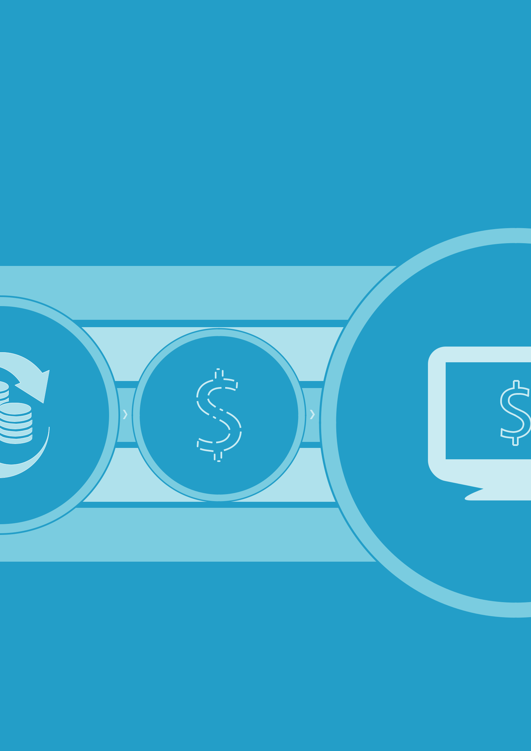44

The Future of Exchanging Value Cryptocurrencies and the trust economy 45
It’s clear that how we pay is changing. What we use to pay One line of thought is that while Bitcoin is a compelling
– the currency, the unit of account and the medium of
technology, there is no sign of the ‘killer app’ – the exchange – is also changing. New stateless digitally native combination of end-user functionality and currency
currencies (Bitcoin being the most prominent example)
attributes – that will get most of the population on board, threaten to supplant sovereign currencies. If the future of similar to how email was the killer app that attracted the society is virtual and stateless – a world in which we general population to the Internet. This belief in the need identify more strongly with a global tribe knitted together for a killer app has resulted in many new FinTech
by social media than the geographically defined nation we solutions and start-ups as financial institutions and
happen to live in – then the future of exchanging value entrepreneurs search for that combination of functionality must also be virtual and stateless.
and business model that will take Bitcoin, or some other cryptocurrency, into general use. New solutions are
A store of value
emerging every day that enable people to save, trade or The libertarians, techno-utopians and gold bugs
spend Bitcoins, from new e-wallets and exchanges
have seized on Bitcoin as the solution to many of
through to services that anonymise payments by passing the problems they see in the current economic system.
them through ‘Bitcoin mixers’46. These mixers combine
Libertarians see Bitcoin as the tool that will enable
unrelated payments in a single bitcoin transaction to hide them to move the world economy out of the hands of
each payment’s origin, industrialising money laundering national governments and fiat currencies and into the
hands of individuals. The technology boosters argue
in the process. There’s also a proliferation of new
that Bitcoin’s low-cost, peer-to-peer approach will
cryptocurrencies, each intended to tweak a
enable us to bring the unbanked into the digital system previous cryptocurrency or create a new one that
and create a truly global currency. Others see Bitcoin takes a different spin on the same basic ideas.
as a tool to avoid government-created inflation (and
the devaluing of savings) by moving to a deflationary
As we have already discussed, currency is woven into
currency, as the number of Bitcoins that can be
the relationship between two parties, and the needs of created is finite. Demand rises, the value of the
this relationship have significant influence on what
currency can only go up, making the prices of goods
currency will be used. One example is the leather
and services fall. The gold bugs see Bitcoin as a more money tokens issued by English shopkeepers,
achievable goal than (to them) the desirable return to mentioned earlier, that provided a way to exchange
the gold standard, with similar benefits.
value but had little value outside the local area,
so that merchants demanded a more universally
As a currency and a technology, Bitcoin has many
accepted sovereign currency to settle larger debts.
supporters who are betting on a future in which
We see a similar dynamic with the development of local national fiat currencies are much less important
currencies, such as the Brixton Pound, also mentioned
than they are today. This is our ‘new paradigm’
earlier. One of the most successful examples of a local scenario, where a shiny new bitcoin paradigm
currency was the demurrage currency used in the
replaces the current financial infrastructure.
Austrian town of Wörgl between 1932 and 1934.
(‘Bitcoin’, with an uppercase ‘B’, refers to the
The parish printed paper notes cal ed ‘labour
currency, whereas ‘bitcoin’, with a lowercase ‘b’,
certificates’ in the midst of the Great Depression when refers to the underlying technology platform.)
the number of unemployed people in the parish had
risen to 350 out of a population of more than 4,000 at a While some early adopters are using Bitcoin preferentially time when federal tax revenue was dropping. The
to store their wealth or pay for their daily needs (where nominal value of notes depreciated by 1 per cent a
possible), it has not been broadly adopted by the public.
month unless the owner affixed a stamp covering the
Bitcoin and other cryptocurrencies, for all their media full extent of the devaluation to the note before the end attention, remain a niche interest.
of the month. These stamps were sold at the parish
hall, providing Wörgl with much-needed tax revenue to
support works programs to benefit the unemployed.
The currency was withdrawn in 1933 after repeated
demands from the Austrian government.




